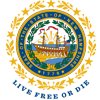Where to Hunt
Locations and Tips for Hunting Lands in New Hampshire
Based on long-standing tradition, nearly all lands in the state of New Hampshire are open to hunting. The "rule of thumb" in New Hampshire is: all state, federal, municipal, county and private land is open to hunting unless it is posted against hunting. However, hunting is a privilege granted by the landowner -- not a right granted to the hunter.
Resources
- Maps of Wildlife Management Units
- Wildlife Management Area Guide
- Hunting on State-owned Lands in New Hampshire
- Trapping on State Lands
- NH Flood Control Areas and Contacts - Federal
- White Mountain National Forest
- State Forests, State Parks, and Conservation Easements (from DNCR Division of Forests and Lands)
- Coastal Conservation Lands -- Maps and more
- Topographic Maps of NH
- The Landowner Relations Program offers ways to work with landowners to preserve hunting access on private lands.
- Fish and Game Maps
Federal Lands
The largest single landholding is the White Mountain National Forest, comprising over 751,000 acres -- nearly 10 percent of the land area in the state. Most of this land is open to hunting, except for the tourist spots and campgrounds. The National Forest's land is shown in Delorme's New Hampshire Atlas and Gazetteer in a shade of darker green.
State Lands and State-Managed Lands
The majority of these lands are open to hunting:
- 117 state forests
- 41 state parks
- 63 other tracts
- 100 Wildlife Management Areas
The Department of Resources and Economic Development (DRED) owns a total of 201,513 acres, most of which is open to hunting. It also manages three flood control areas totaling 13,446 acres and conservation easements on thousands of additional acres.
The New Hampshire Fish and Game Department owns or has hunting rights to nearly 30,000 acres distributed over nearly 100 tracts, most of which are called Wildlife Management Areas.
- Read the FAQs on "Hunting on State-owned Lands in New Hampshire"
Private Land Owned by Paper or Timber Companies
Several major paper and timber companies in the state have kept their lands open to hunting by the public for over half a century. They have maintained a close working relationship with the Fish and Game Department to provide access to some of the largest private tracts of land across northern New Hampshire.
Most of these lands remain open because of the respect hunters have shown over the last several decades. Please continue this respect by staying off wet or soft roads and giving the right-of-way to logging trucks and equipment. Do not park or block any road or barway. Respect gated or closed roads. Some ATV use is allowed in designated areas, but it is prohibited by some companies. Make local contacts for specific information. These tracts are not listed in the NH Atlas and Gazeteer.
Private, County and Municipal Lands
80% of New Hampshire's forestland is privately owned. Most private lands -- especially larger tracts -- remain open to hunters, unless posted against hunting. New Hampshire Fish and Game recommends that each hunter contact landowners and seek permission to hunt. Even posted land can be accessed by contacting the owner prior to hunting. Please respect all landowners wishing to keep their lands posted.
Many landowners seek reduced tax burdens by placing their land under current land use tax assessment. One category of current use tax reduction requires the landowner to keep land open to public use, including hunting, for an additional 20% tax reduction. This is a real incentive to keep private land open to hunting. Check with town officials for Current Use tax land.
A considerable amount of privately-held acreage is open to hunting. In the early 1990s, the state invested nearly $46.4 million under the Land Conservation Investment Program to protect land from development by buying conservation easements. Conservation easements require the land be kept open to the public in perpetuity, including hunting. More than 100,000 acres were protected with conservation easements. These lands are depicted in light green in the NH Atlas and Gazeteer. Additionally, many county and municipal lands, such as watershed protection areas, are open to hunting. Check locally for rules regarding hunting in these sites.



